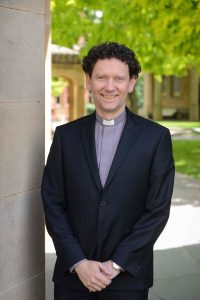
Jesus said, “For where your treasure is, there your heart will be also.” What do you treasure in life? Let me ask this in a different way. If you were suddenly forced to move and could only take a handful of things with you, what, or perhaps who, would they be?
On my long service leave in Term 4 last year, Mrs McCall and I caught the train, The Ghan, to Darwin. It was a great journey on the train and one I highly recommend. One of the fascinating things about visiting Darwin itself, especially going there as a tourist, is noticing the things that are front and centre in their culture, namely, the things that jump out at you when you visit. There is a big emphasis on the existence of crocodiles, unsurprisingly, and Kakadu is a great drawcard to see crocodiles and all sorts of other wildlife. There is also a big emphasis on the fact that Darwin was the only part of mainland Australia bombed during the Second World War; and there is quite a lot of information about Cyclone Tracy, which destroyed the city on Christmas Eve and Christmas Day in 1974.
The residents had very little time to flee the city. Most in fact didn’t flee, because the initial forecast was that the cyclone was going to miss Darwin. I remember meeting someone who survived Cyclone Tracy and, interestingly, he placed very little value on material possessions. “They’re just not that important to me,” he said, “because I lost all of them in Cyclone Tracy. What matters to me is my family and the people I love.”
Possessions do not last forever. Seeing the museums in Darwin and the audio/visual presentations about Cyclone Tracy was a stark reminder to me that material possessions do not last forever. If I think about my oldest physical possession, it’s certainly not an electronic device or an item of clothing – it’s probably my first Bible or my first Prayer Book. There will be an old photo of me as a baby somewhere, although I think Mum still has all of those. But all the other things, the ancient computer I bought with my own money as a teenager or the pair of jogging shoes I was so proud of as a university student – all are long gone!
Ash Wednesday, the day which marks the beginning of the season of Lent, is a reminder to live simply: to take joy in the simple things of life. At our Ash Wednesday services in both the Junior and Senior Schools, we invited students and staff to have a cross traced in ash on their foreheads by one of the staff members up the front. We said the words, “Remember that you are dust: commit yourself again to Truth, Respect and Service.” It is a reminder of what is important in life: life is about living simply, putting aside our obsession with possessions, and instead focussing on the simple joys God gives us every day. Another way of expressing this is to be grateful for the beautiful things in life which we experience every day. Gratitude is a great way of being reminded to live simply.
It is also a reminder to be compassionate to others. We are not to become obsessed with money and possessions, because ultimately, in themselves, they don’t bring happiness. They don’t last forever, as we Australians know from our bushfires too. It is a reminder to be compassionate to those who do not enjoy the same privileges that we enjoy: the hungry, the homeless, the oppressed. We should never allow our love for the possessions we have, to overrule our compassion for those who have little or have nothing. It is a sign that we are committing ourselves to serve other people. It is a sign that people, not material possessions are the most important thing in our lives.
The Reverend Dr Theo McCall
School Chaplain
